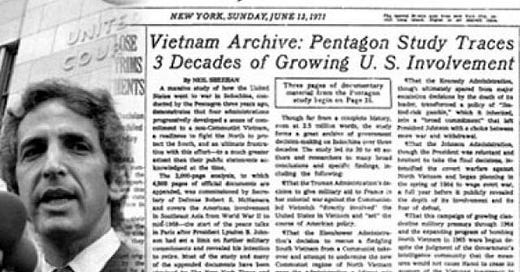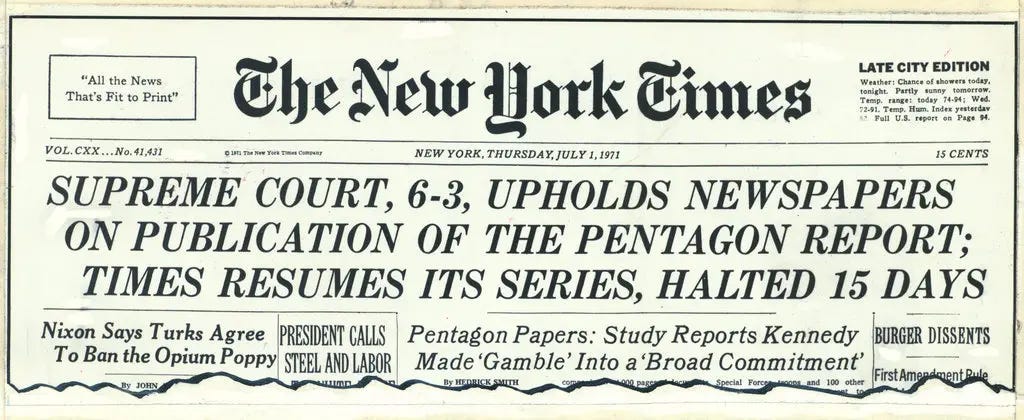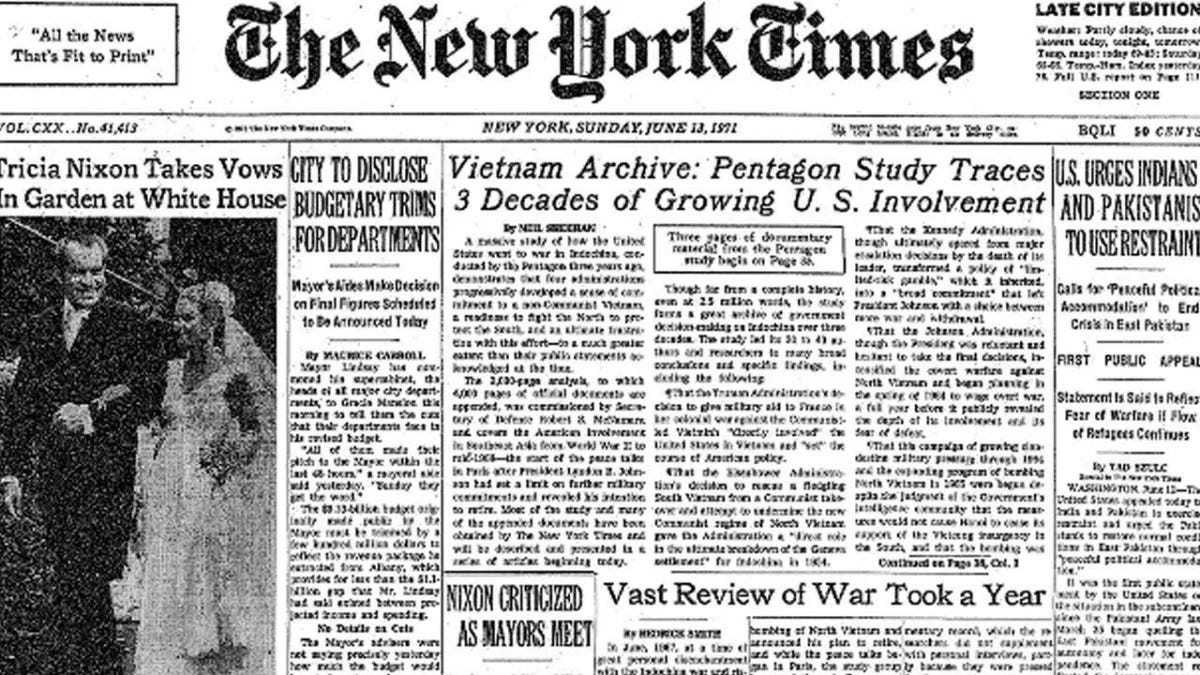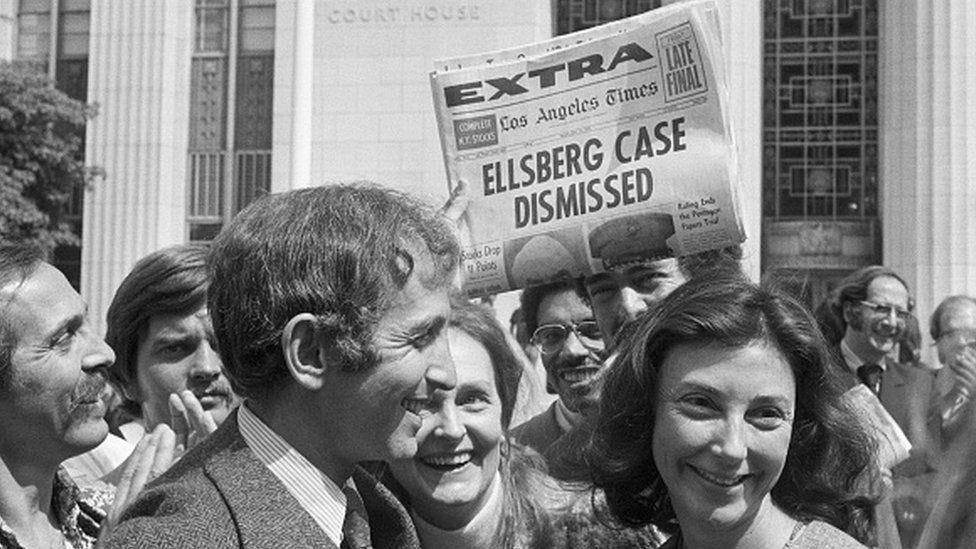“The Pentagon Papers are mesmerizing, not as documentation of the history of the U.S. war in Indochina, but as insight into the minds of the men who planned and executed it.” (Arundhati Roy)
On June 13, 1971, the New York Times published an article by Neil Sheehan called, “Vietnam Archive: Pentagon Study Traces 3 Decades of Growing U.S. Involvement.” It was the first installment of a 7000-page document that came to be forever known as the “Pentagon Papers.”
(Can you imagine a corporate media outlet doing something like this today?)
How important was the public airing of a secret government study of decision-making about the Vietnam War? None other than Henry Kissinger labeled the man who leaked that study — Daniel Ellsberg — “the most dangerous man in America.” (Projection much?)
Author H. Bruce Franklin called Ellsberg, “That young man with boundless promise who graduated third in his Harvard class of 1,147 in 1952 when America too seemed boundlessly promising.”
An officer in the U.S. Marines, and a Cold War theoretician for the Pentagon, Ellsberg was “not content with planning wars for others to fight and defending the Vietnam War on college campuses, (so he) volunteered in 1965 to go to Vietnam” where he “displayed such personal bravery in combat that some, such as his present biographer, claim he must have been suicidal.”
All that changed in 1969 when Ellsberg discovered that President Richard Nixon was “the fifth president in a row now…choosing to prolong the war in vain hopes that he might get a better outcome than he could achieve if he’d just negotiated his way out.”
Nixon, like those leaders [sic] who came before him, would not accept anything that even looked like defeat and nothing would change his or his handlers’ minds.
“That meant that if his decision was going to be changed — and because I cared about Vietnam and this country, I felt quite urgently that I wanted the United States to stop bombing them and stop killing Vietnamese — the pressure would have to come from outside the executive branch,” explained Ellsberg. “Reading the Pentagon Papers and reflecting on Vietnam revealed to me (that) you could do more for the country outside the executive branch.”
Knowing full well his actions might result in his spending the rest of his days behind bars, Ellsberg leaked the document to the Times. The Nixon administration knew what the impact of this leak might be.
“To the ordinary guy, all this is a bunch of gobbledygook,” White House Chief of Staff H.R. Haldeman told Nixon on June 14. “But out of the gobbledygook comes a very clear thing: you can’t trust the government; you can’t believe what they say; and you can’t rely on their judgment. And the implicit infallibility of presidents, which has been an accepted thing in America, is badly hurt by this, because it shows that people do things the president wants to do even though it’s wrong, and the president can be wrong.”
Further demonstrating just how wrong a president can be, Nixon ordered the Times to halt publication. This was done through a temporary restraining order from a federal district court.
While the government and the Times tangled, the Washington Post entered the fray by publishing parts of the Pentagon Papers on June 18, 1971 — this despite a personal plea from Assistant U.S. Attorney General William Rehnquist (later Chief Justice of the U.S. Supreme Court from 1986 until his death in 2005).
Within two weeks, the case reached the Supreme Court where, in a 6-3 decision, the government was told it could not block the publication of the Pentagon Papers. Two days earlier, Ellsberg had been charged with theft, conspiracy, and espionage but Nixon’s ability to be wrong knew no bounds.
In September 1971, the president had the infamous G. Gordon Liddy and E. Howard Hunt break into Ellsberg’s psychiatrist’s office in an effort to dig up dirt on the whistleblower. This break-in became public knowledge during the Watergate scandal (along with an alleged plot to assassinate Ellsberg) and all charges were eventually dropped.
Ellsberg’s courage had opened the eyes of a nation blinded by propaganda. As the wounded marine-turned-author, W.D. Ehrhart, wrote in his memoir, Passing Time, about reading the Pentagon Papers:
“Page after endless page of it. Vile. Immoral. Despicable. Obscene. I’d been a fool, ignorant, and naive. A sucker. For such men, I had become a murderer. For such men, I had forfeited my honor, my self-respect, and my humanity. For such men, I had been willing to lay down my life.”
But Daniel Ellsberg said: Not in my name.
All throughout history, people have stood up —regardless of risk — to expose deception. Their stories may get obscured but we can still reclaim them as inspiration.
May each of us find ways to be more “dangerous” in the eyes of the Parasite Class™.








I've read Daniel Ellsberg's book, "Secrets: A Memoir of Vietnam...", a surprisingly riveting account of getting the Pentagon Papers published. I doubt if today the pussy newspapers would go out on a limb as they did(reluctantly) back in the 70's. If Nixon's spooks were actually competent (?), things would even be worse today. I think they(the spooks) were supposed to be caught to bring down Nixon, which, in fact did happen. Seedy is too nice a term for government actors. The capitalists have become front and center these days. Bezos, Musk, Gates, Koch(s), et. al. Ruthless comes to mind. Peace
Americans should be protesting in support of Edward Snowden and Julian Assange. It appears that the American people have lost their souls.